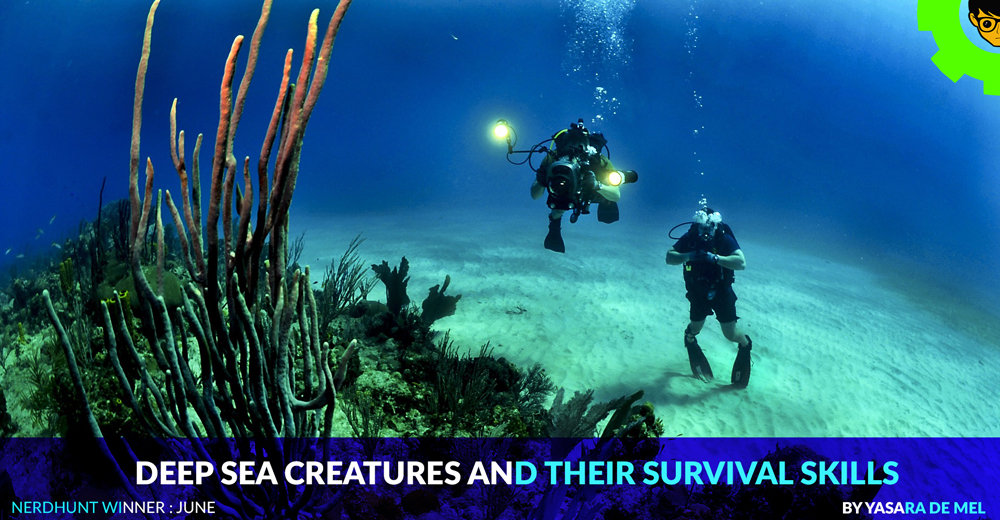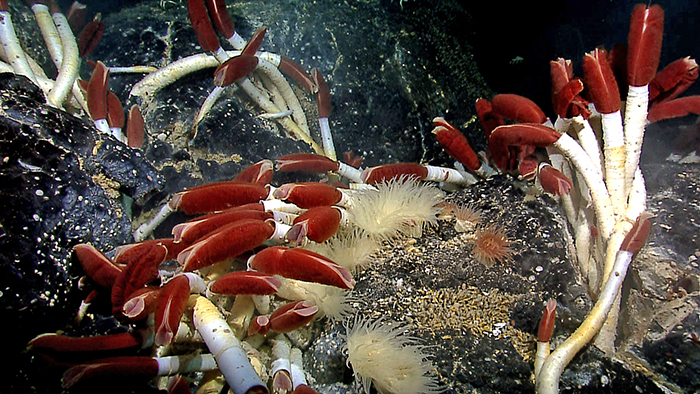
Away from landmass, the ocean covers more than half of our planet and yet it is far beyond our reach. As we go below into the depths of oceans the pressure builds and the temperature drops. Even there is zero sunlight.
|
?But in these ocean depths new mysterious creatures appear. The Sea spiders a small relative of the shrimps and crabs has strange leg like appendages which are feathered to stop it from drowning. Also they can enmesh marine snow which it wipes carefully into its jaws.
photo credit : mirror.co.uk
|
|
The Artic cucumber was recently discovered in the deep sea and is now one of some 1,250 known sea cucumber species. Sea cucumbers are echinoderms related to sea stars and sea urchins. When threatened, the different species resort to a bizarre arsenal of defenses, which includes sliming their enemies with a web of sticky threads or confusing them by ejecting their own internal organs out of the anus.
photo credit : oceain.si.edu
|
|
No vestige of sunlight penetrates the deep ocean depths and food is very scarce and nothing could afford to waste any energy. The Dumbo octopus has extraordinary flapping ears to hover effortlessly over the sea floor. They do not use the jet propulsion used by their shallow water relatives.
photo credit : oceana.org
|
|
T?he weirdest is the Vampire squid from hell. A bioluminescent bacterium shines from pockets on its arms to confuse its predators. The squid’s light show is probably its main form of defense, since it lacks the ink sack which is present in other squid species. It can, however, eject a thick cloud of glowing, bioluminescent mucus from the tips of its arms when threatened.
photo credit : deepseacreatures.org
|
|
photo credit : phys.org
|
The pacific hagfish, also known as the slime eel, is a primitive bottom-dweller with no jaws, teeth, or stomach. The animal lacks even true eyes but it does have an incredible, and somewhat disgusting, defense mechanism. When threatened, the hagfish secretes copious amounts of ropy, sticky, slippery and snotty slime. This protein-and-sugar-based ooze is an unappetizing deterrent to predators. When the danger has passed, the hagfish cleans up by tying itself in a simple overhand knot and pulling its body through—scraping it clean.
|
|
I?n the deep near the Galapagos Islands, one and half meters down in a site known as the Nine North, there are Giant tube worms. Some worms reach 5m in length. They are the fastest growing marine invertebrates known. Crushing pressure, freezing temperatures and zero sunlight isn’t enough of a challenge for giant tube worms. They have adapted to thrive at the edge of hydrothermal vents, which spew superheated water saturated with toxic chemicals.
|
photo credit : Wikipedia.org
|
|
Nautilus spends its days hiding 400 meters down. Its graceful shell contains gas filled floatation chambers that control its depth. It travels shell first so it cannot see where it’s going. It has small tentacles which carry highly developed chemical sensors to detect predators and prey.
photo credit : wikipedia.org
|
ABOUT YASARA
Hey! I’m Yasara de Mel from Colombo, Sri Lanka. I’m a Science undergraduate at the Open University of Sri Lanka majoring in Zoology. As an individual with a desire to help animals from very young age, I have always wanted to learn about the world of animals. My ultimate goal is to be a voice to the voiceless and conserve nature in the process. I love sharing my knowledge with anyone who is interested in this Zoology because it’s a field which is full of mysteries and interesting facts. I finally found a place where I could share my knowledge with not just few people but the world! I got to know about Nerdynaut through a friend at our university. This platform is ideal for young students like us who are eager to learn and share our knowledge. I thank Nerdynaut for bringing our inner hidden talents to be used for the sake of future goodness.
Hey! I’m Yasara de Mel from Colombo, Sri Lanka. I’m a Science undergraduate at the Open University of Sri Lanka majoring in Zoology. As an individual with a desire to help animals from very young age, I have always wanted to learn about the world of animals. My ultimate goal is to be a voice to the voiceless and conserve nature in the process. I love sharing my knowledge with anyone who is interested in this Zoology because it’s a field which is full of mysteries and interesting facts. I finally found a place where I could share my knowledge with not just few people but the world! I got to know about Nerdynaut through a friend at our university. This platform is ideal for young students like us who are eager to learn and share our knowledge. I thank Nerdynaut for bringing our inner hidden talents to be used for the sake of future goodness.












